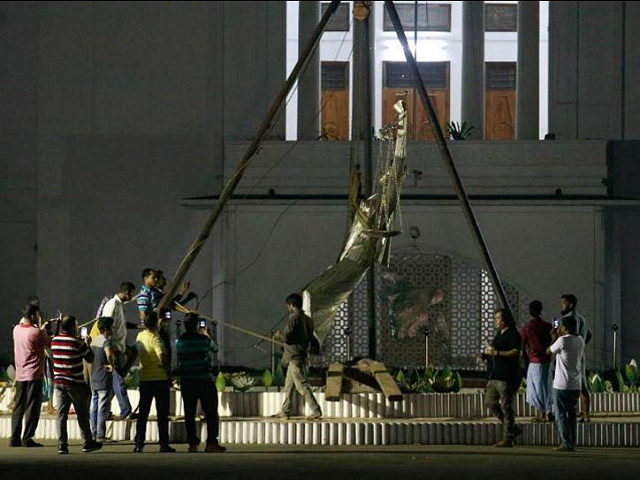Authorities in Bangladesh have removed a statue located in Dhaka from the public square after an Islamist outcry over its presence.
The statue was a sculpture of the Greek goddess of divine order, Themis, wearing a sari and placed outside Bangladesh’s Supreme Court to signify justice and equality before the law.
Islamists argued that the statue was offensive to Muslims due to its depiction of a Pagan idol and demanded its removal via large-scale protests in the streets of Dhaka. The Islamist group Hefazat-e-Islam, which campaigns on issues of Islamic fundamentalism, organized the protests and threatened to organize angry mobs nationwide if the statue was not removed.
The Islamic pressure group, which still exerts significant control over Bangladesh’s education system and submitted a 13-point charter to the government in 2013, demanded capital punishment for blasphemy against Allah.
Bangladesh’s Prime Minister Sheikh Hasina has approved the statue’s removal, although secular groups have come out in defense of the statue, causing further division between Muslims and those promoting liberal values.
Bangladesh has suffered Islamist social pressure and mob violence for years, with increasingly violent results. In 2016, a Muslim mob raided a Hindu temple after a member reportedly mocked a holy Islamic site. That same year, a Vogue model was murdered for not wearing the hijab, while an Islamic mob hacked to death 26-year-old blogger Nazimuddin Samad with machetes after he reportedly criticized aspects of religion.
In a gathering with Muslim clerics last month, Hasina, elected on a secular platform, expressed her confusion with the statue’s construction.
“Why would the statue of Greek Themis be set up in Bangladesh?” she asked. “The Greeks had a certain type of costume, but here a statue has been built and it is wearing a sari… I don’t know why such an incident happened.”
Some commentators have lamented the removal as a concession to conservative Islamists in the run-up to the country’s upcoming 2019 elections. Talking to reporters, the artist behind the sculpture, Mrinal Haque, described the decision as a “slap in the face of the progressive people in this country.”
“This is a Bengali woman, wearing a sari. There is nothing Greek about it. This is nothing but a symbol of justice,” he said. “This is an injustice. This is not fair. My mother has died and I can easily compare my present feeling with that loss.”
Meanwhile, Bangladeshi attorney general Mahbubey Alam revealed to the Dhaka Tribune that the country’s chief justice ordered the statue be placed elsewhere.
“He told us he did not want any untoward incident over the statue in front of the supreme court. It should be removed and placed in some other location so that there are no questions raised about it,” he said. “We also advised him that it would be prudent to remove the statue from in front of the court.”
The statue’s removal was broadcast live on television, as groups of students protesters were blocked by police who fired tear gas at those approaching the scene.
You can follow Ben Kew on Facebook, on Twitter at @ben_kew, or email him at bkew@breitbart.com.

COMMENTS
Please let us know if you're having issues with commenting.